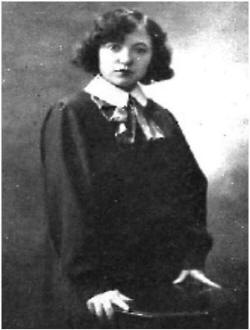Queer Places:
Père Lachaise Cemetery, 16 Rue du Repos, 75020 Paris
 Rirette
Maîtrejean (born
August 14,
1887 as Anna Henriette Estorges in
Saint-Mexant , †
June 11,
1968 in
Limeil-Brévannes ) was a
French
anarchist and
feminist who belonged to the
individual-anarchist scene , the milieu libre , in
Paris .
She became known for her criticism of
illegalism and her friendship with
Albert Camus .
Rirette
Maîtrejean (born
August 14,
1887 as Anna Henriette Estorges in
Saint-Mexant , †
June 11,
1968 in
Limeil-Brévannes ) was a
French
anarchist and
feminist who belonged to the
individual-anarchist scene , the milieu libre , in
Paris .
She became known for her criticism of
illegalism and her friendship with
Albert Camus .
Rirette Maîtrejean was born as Anna Henriette Estorges in Saint-Mexant in
southwestern France in 1887 and lived on a farm there until the family moved
to
Tulle a few years later.
The father died in 1903, which plunged the family into deep poverty.
Rirette, who was 16 at the time, wanted to be a teacher;
the father's early and unexpected death made this impossible.
Her mother wanted to marry her because of the financially precarious
situation, but Rirette persistently refused.
So she fell over with her mother and in 1904 ran away to Paris alone and
penniless.
There she found work as a
seamstress and attended the so-called "Popular Universities" (
Universités populaires ) and the "Popular Discussion Events" (
Causeries populaires ) - institutions for self-taught education of the
working class .
From there, she made her first contacts to the individual anarchist scene, the
“milieu libre” around the magazine L'anarchie , which was founded in
1905 by the individual anarchists Albert Libertad (1875–1908) and Anna Mahé
(1881–1960) ,
In 1905 she began a relationship with Louis Maîtrejean (born 1882), a skilled
worker, anarchist and secretary of the Tanners' Union, whom she married in
September 1906 when she became pregnant. In quick succession, they had two children, Henriette (father
unknown), and Sarah with Louis as their biological father. As was customary in these circles at the time, she was an advocate of
free love .
Rirette Maîtrejean belonged to the editorial collective of L'anarchie ,
one of the most important periodicals of the
individualistic anarchism of that time in France with a house in
Romainville , a suburb of Paris, in 1909 and then again in 1911/12. In
this context, she also met her last partner, the revolutionary
Victor Serge , with whom she broke up in the early 1930s because of his
turn to
Bolshevism .
Serge emigrated to the
Soviet Union in 1919 and became a member of the
CPSU .
From 1923 Maîtrejean worked as a
corrector at
the French daily newspaper
Paris-Soir . In
the course of this activity, she also came into contact with
anarcho-syndicalists and organized herself in the anarcho-syndicalist
union "Syndicat des correcteurs" (Union of Proofreaders). In
1940, Maîtrejean met
Albert Camus , who worked as a journalist and editorial secretary for
Paris Soir , and a lifelong friendship developed between them.
Iris Radisch writes in her Camus biography: "In political terms, Camus was
ultimately the French libertarians, to whom he has maintained good contacts
through his friend Rirette Maîtrejean since his time at the Paris Soir
."
[7] Marin summarized Maîtrejean's decisive influence on Camus'
political thinking in that she introduced him to the libertarian tradition of
thought.
[11]
Rirette Maîtrejean said about Camus that he was "not only a lovely person",
but also a "reliable friend" who was "extremely close in terms of content" to
anarchism.
[14] In the 1950s she met him at meetings in the circle around the
libertarian magazine Témoins in Paris.
After his death in 1960, she worked on an anthology in his honor.
[16]
Until she went blind in old age, Maîtrejean worked as a proofreader.
She died in 1968 in a hospital in Limeil-Brévannes
[17] and is buried in a
columbarium in the
Père-Lachaise cemetery.
[18]
My published books:


BACK TO HOME PAGE

- https://de.wikipedia.org/wiki/Rirette_Maîtrejean
 Rirette
Maîtrejean (born
August 14,
1887 as Anna Henriette Estorges in
Saint-Mexant , †
June 11,
1968 in
Limeil-Brévannes ) was a
French
anarchist and
feminist who belonged to the
individual-anarchist scene , the milieu libre , in
Paris .
She became known for her criticism of
illegalism and her friendship with
Albert Camus .
Rirette
Maîtrejean (born
August 14,
1887 as Anna Henriette Estorges in
Saint-Mexant , †
June 11,
1968 in
Limeil-Brévannes ) was a
French
anarchist and
feminist who belonged to the
individual-anarchist scene , the milieu libre , in
Paris .
She became known for her criticism of
illegalism and her friendship with
Albert Camus . 
